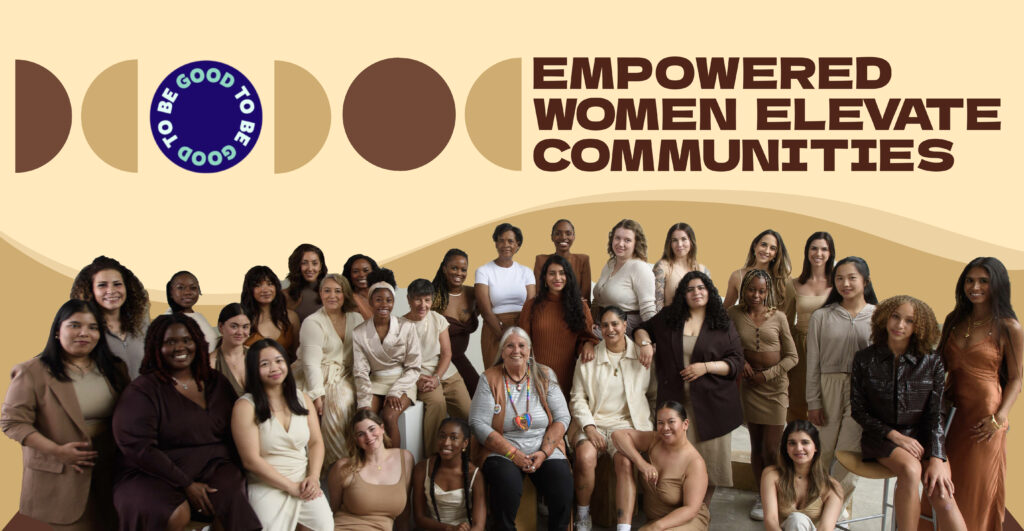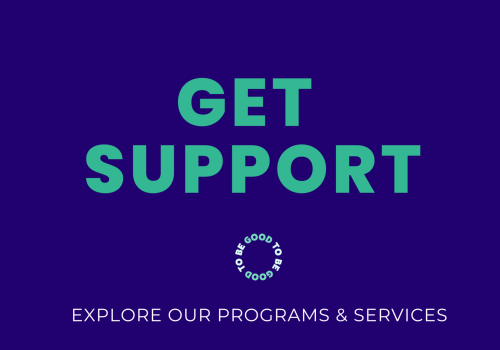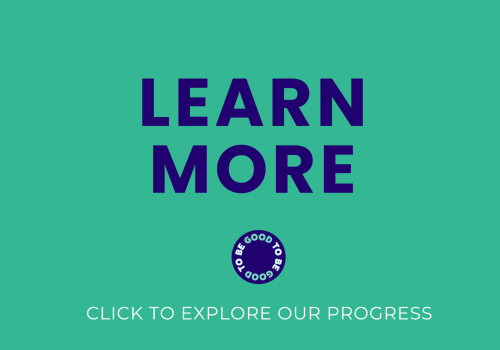

MISSION
GOOD TO BE GOOD is an intersectional, community-wide nonprofit dedicated to serving and empowering women and gender-diverse people from marginalized communities. Our mission is to build a kind, more connected, and equal world.
As a grassroots organization, we provide social and community services, advocacy, and integrated programs, aimed at co-creating meaningful progress that support women and advance gender equity.
Our community-driven work centres the voices, rights, and lived experiences of women and gender-diverse people—especially those impacted by systemic inequities of violence, poverty, exclusion, and discrimination.
VISION
Guided by the principles of intersectional feminism and the values of social justice and interconnectedness—we boldly envision a future that is radically equitable, compassionate, and sustainable.
In solidarity, we are committed to the liberation of every woman. We harness our collective power to challenge injustice and expand a world that truly values all life.
TOWARDS THE HORIZON OF EQUITY

GOOD TO BE GOOD exists to advance gender equality and women’s empowerment, and protect the rights and opportunities of women & gender-diverse people.
Our organization is guided by an intersectional gender, racial, and economic justice lens, recognizing that gender inequality is shaped by overlapping systems of power and exclusion. This lens informs how we show up, what we prioritize, and who we centre in our work.
We offer an expanding range of accessible, inclusive programs, support services, and advocacy initiatives that respond to the real barriers faced by women and gender-diverse people from marginalized and underserved communities. From skills-building programs to peer support and community advocacy, our work creates opportunities to access resources, build connection, stay safe, and exercise rights—driving collective progress toward gender equity.
Since 2016, we’ve supported more than 1,000 women & gender-diverse people across Canada—including in Ontario, British Columbia, Saskatchewan, and Alberta — and distributed over 350,900 essential resources to those affected by social isolation, income inequality, exclusion, gender-based violence, discrimination, and systemic barriers.
Our work challenges inequality by advancing social and economic opportunity, meeting essential needs, and empowering voices too often silenced and excluded from power and agency. Through rights-based advocacy and community-led action, we’re working toward a future that is just, equitable, and connected — one that refuses to leave women & gender-diverse people behind.
We continue to deepen our dedication by fostering grassroots interventions and community-informed solutions—designed for women, by women. We believe those most affected by injustice are best positioned to lead change. By meeting people where they are, we help build power, protect rights, and foster resilient, equitable communities.

At GOOD TO BE GOOD, we centre people who are most impacted by systemic inequities. Our work is for women, non-binary, and gender-diverse people (18+) across Canada who face barriers rooted in marginalization, exclusion, discrimination, or unequal access to opportunity.
This includes people who identify as:
- Indigenous, Black, racialized
- 2SLGBTQIA+ and Two-Spirit
- Survivors of gender-based, structural, or intimate violence
- Refugees, newcomers, and immigrants
- Living with low income or impacted by poverty
- Living with visible or invisible disabilities
- Experiencing isolation, discrimination, or mental health challenges
We recognize that many people experience overlapping barriers—and that these challenges are shaped by systems, not personal failure.
WHO WE SERVE:
Our programs and services are available to women, non-binary, and gender-diverse people (18+) living in Canada who are impacted by systemic inequality or face barriers related to poverty, violence, discrimination, isolation, or exclusion.
While individual programs may have its specific focus or eligibility, all of our work is rooted in care, dignity, and a commitment to equity. Learn more here.
WE PRIORITIZE WHAT WE KNOW IS POSSIBLE:
- Women and gender-diverse people deserve to live free from violence, discrimination, and injustice.
- We work to address the systemic barriers that uphold inequality—building solutions rooted in compassion, justice, and equity.
- We believe in a future where women and gender-diverse people, especially those with intersecting identities and lived experiences, are cared for, invested in, and able to live safe, thriving lives with access to their human rights and opportunities.
Why women and gender diverse people?
The fight for gender justice is universal.
Women and gender-diverse people from underserved or historically marginalized communities are disproportionately impacted by unjust systems rooted in patriarchy, racism, colonialism, and other forms of oppression—and are often the first to be left behind. These systemic forces create compounding barriers—limiting access to healthcare, housing, legal support, education, decent work, and safety. These challenges are not isolated; they intersect, deepen inequalities, and constrain agency, freedom, and choice.
Too often, women and gender-diverse people are excluded from decisions that affect their lives—in homes, workplaces, communities, and governments. During crises, they are among the first to experience health and safety disparities, economic instability, and systemic neglect—especially when support systems fail to meet their specific needs. As caregivers, frontline workers, and community leaders, they hold up our communities, yet remain under-supported in recovery, funding, and justice.
Advancing gender equity is one of the most effective ways to reduce poverty, build safer and prosperous communities, and create lasting social, political, and economic benefits. It means addressing the root causes of inequality, dismantling oppressive systems, and ensuring everyone has access to the tools, resources, support, communities, and opportunities they need to thrive.
At GOOD TO BE GOOD, we fight for and alongside women and gender-diverse people because equity for those most marginalized uplifts us all. The road to equality is long, but each step forward brings us closer to the future we all know is possible.
GOOD TO BE GOOD is community-first, feminist, and intersectional—because woman and gender-diverse person deserves dignity, equity, and care. Informed by lived experience and grounded in research, our team drives progressive solutions that challenge systems and create better conditions for those most impacted.
Our approach and framework involves designing and delivering programs and services that are community-centred, trauma-informed, and anti-oppressive. Our commitment to gender equity means we focus on addressing systemic barriers while responding to the immediate and practical needs of the communities we aim to serve.
We use both short-term and long-term strategies that tackle root causes of inequity while supporting individuals in their day-to-day lives. We ask: Whose voices are missing? Who holds power? What would change if those closest to the issues were also closest to the solutions?
Our work is guided by the following principles:
Trauma-informed and justice-centred
Strengths-based and care-oriented
Feminist, human rights, and gender-responsive
Anti-oppressive, culturally responsive, and accessible
Community-centred
We actively aim to work alongside our communities. This means valuing lived experience, centring participants as experts of their own lives, and creating pathways to shift and share power. Through continuous reflection and feedback, we remain responsive and accountable to the people we serve.
As long as injustice has existed, women have resisted it. We proudly stand on the shoulders of the many who came before us—and remain inspired by those who continue to show up, speak out, and dream forward.
At GOOD TO BE GOOD, justice and equity guide everything we stand for.
We understand that gender justice is inseparable from the systems that shape people’s lives—including racism, poverty, ableism, colonialism, xenophobia, homophobia, and transphobia. These interconnected harms disproportionately affect women & gender-diverse people and require collective responsibility and systemic change.
Our values are rooted in dignity, self-determination, care, and accountability. They guide how we hold power, centre lived experience, and affirm the full humanity of the communities we serve.
Our work challenges power imbalances, centres lived experience, and affirms the full humanity of the communities we serve. And our values are both a reflection of our commitments today and a compass for how we continue to grow toward meaningful, lasting change
Learn about all of our organizational values here.
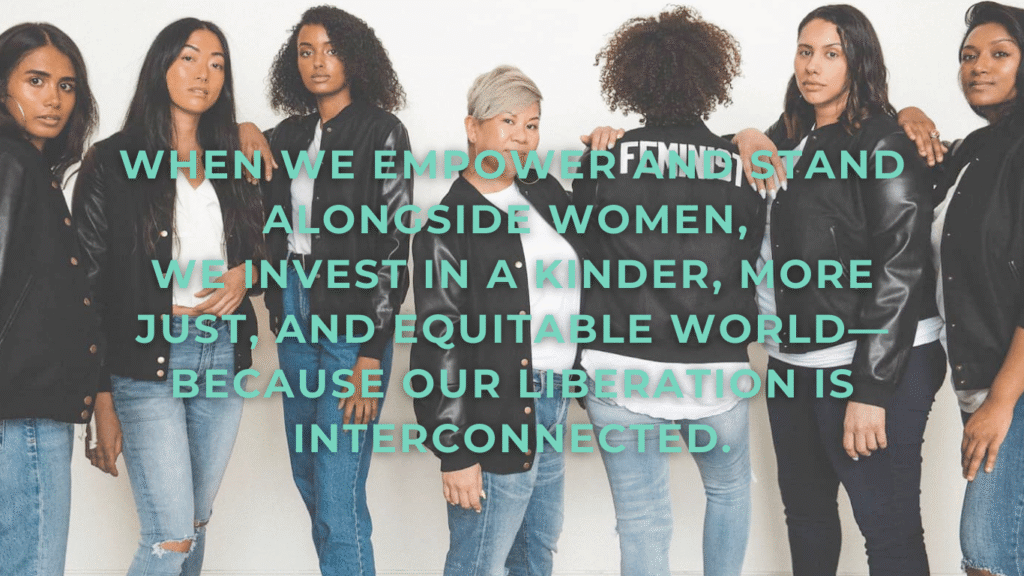
WE ARE ALL CONNECTED
A letter from GOOD TO BE GOOD’s Executive Director
How can we envision a place worth going so we may do the work of reimagining equitable connected communities? How can we make hope a constant presence and honour our nature of interconnectedness to improve conditions for those who have not yet experienced it?
When we nurture solidarity in the pursuit of an equal and compassionate world, we uncover a profound truth about what it means to be human: within our power lies our shared belonging. By growing our “good” toward others, we care for ourselves and the future we all share—actively participating in its transformation and challenging the colonial and patriarchal systems built on zero-sum thinking.
At GOOD TO BE GOOD, we believe this change begins with—and for—women.
Women’s issues are everyone’s issues. Because we are all interconnected: our struggles are linked, our lives are circular, and our freedom goes without another. Life doesn’t start or end with any one person. By deeply recognizing this truth, we can work to improve our world—one we wish to inhabit and know is within reach.
Shoulder-to-shoulder, a just, connected, and kind world requires us to actively tap into our collective power through simple yet bold acts: embodying kinship, building in numbers, upholding humanity, and remaining awake to the interdependence of life. We need to find strength and hope in one another, work collaboratively to hold the line in movements, and mobilize together. We must think about everyone involved so no one gets left behind—and do away from systems and ideologies that hurt and harm us by moving toward spaces that hold us. The very systems we’re fighting against live within us, too. Thus, our humanity insists that we must do this together—to interrupt injustice without mirroring it—because everything worthwhile is done this way.
While we’re here, we got to make it our work!
May you say no more to injustices placed against women, girls, and gender-expansive people. May you find the possibilities to turn to one another, even those who confront these injustices in the raw. May you harness the forces of radical love. May you build the expansive communities to belong and be equal.
Let it land in your heart again and again that good, in all of its form, exists—it’s us who makes this possible.
– Char San Pedro
Founder of GOOD TO BE GOOD and Gender Equity Advocate
SIGN UP. STAY CONNECTED.
BE INSPIRED BY THE POWER OF WOMEN.
Get monthly updates, stories, resources, and ways to take action.
Thank you for joining us in the movement of building a better world for all women.
By joining our newsletter list, you agree to share your email address with Good To Be Good to receive updates, education, resources, and news from us. Use the unsubscribe link in those emails to opt-out at any time. We take privacy seriously and we are committed to protecting and respecting your personal data. It means a lot to us that you trust us with your data.
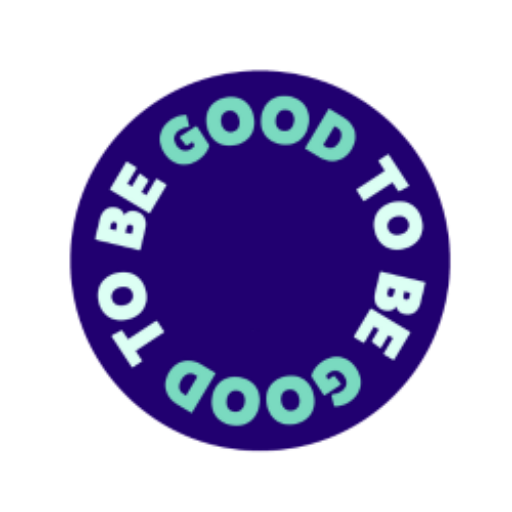
 DONATE
DONATE